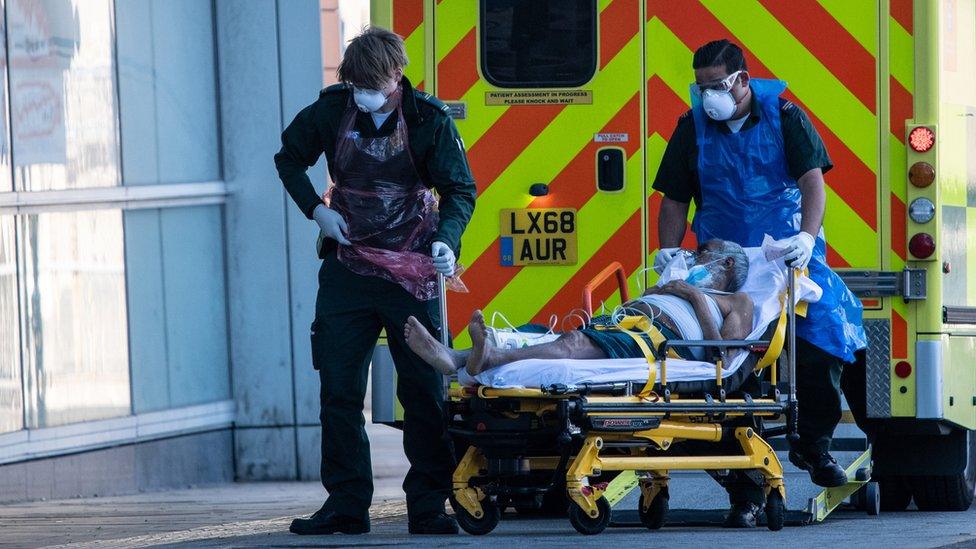Coronavirus: Boris Johnson to update UK on 'steps to defeat' the disease
- Published
- comments
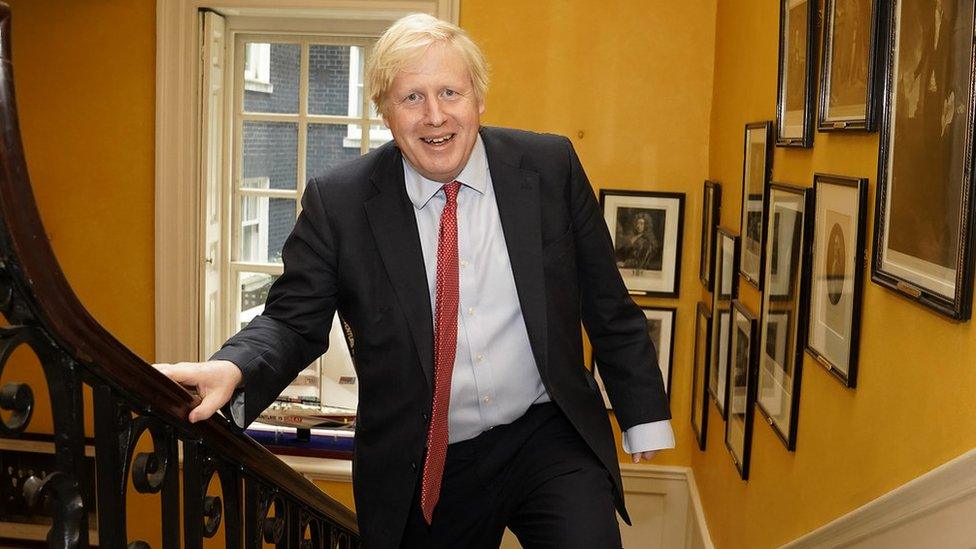
Boris Johnson arrives back in Downing Street after the birth of his son on Wednesday
Boris Johnson is due to lead the daily coronavirus briefing for the first time since his return to work, after chairing a cabinet meeting.
Ahead of the press conference, Mr Johnson urged UK businesses to "keep going in the way that you have".
No 10 said he will update the UK on the government's "steps to defeat" the disease from 17:00 BST.
Meanwhile, Downing Street faces the deadline for its target of 100,000 daily virus tests.
In a tweet, external, Mr Johnson acknowledged "how hard and stressful it has been to give up even temporarily those ancient and basic freedoms, not seeing friends, not seeing loved ones, working from home, managing the kids, worrying about your job and your firm".
Speaking directly to businesses, the prime minister said he understood their "impatience", but added: "I must ask you to keep going in the way that you have kept going so far, so we can protect our NHS and save lives."
The UK government's chief scientific adviser Sir Patrick Vallance and chief medical adviser Prof Chris Whitty will appear alongside the PM at Thursday's briefing.
Mr Johnson, who has just recovered from Covid-19, returned to work in Downing Street this week but missed Prime Minister's Questions on Wednesday following the birth of his son with his fiancee Carrie Symonds.

A SIMPLE GUIDE: How do I protect myself?
AVOIDING CONTACT: The rules on self-isolation and exercise
HOPE AND LOSS: Your coronavirus stories
LOOK-UP TOOL: Check cases in your area
TESTING: Can I get tested for coronavirus?

Downing Street has insisted the government is "working hard" to hit its target of 100,000 tests per day, but earlier Justice Secretary Robert Buckland admitted it might not be met.
Health Secretary Matt Hancock pledged to reach the goal by the end of April. The latest figures show it reached just over 52,000 coronavirus tests on Tuesday, while testing capacity was at just over 77,000.
A scientist advising the government on testing, Prof John Newton, said he is "pretty confident" the government will hit the target, but warned there will be a lag in the data.
He said it would not be clear whether the target had been reached until the end of the week.
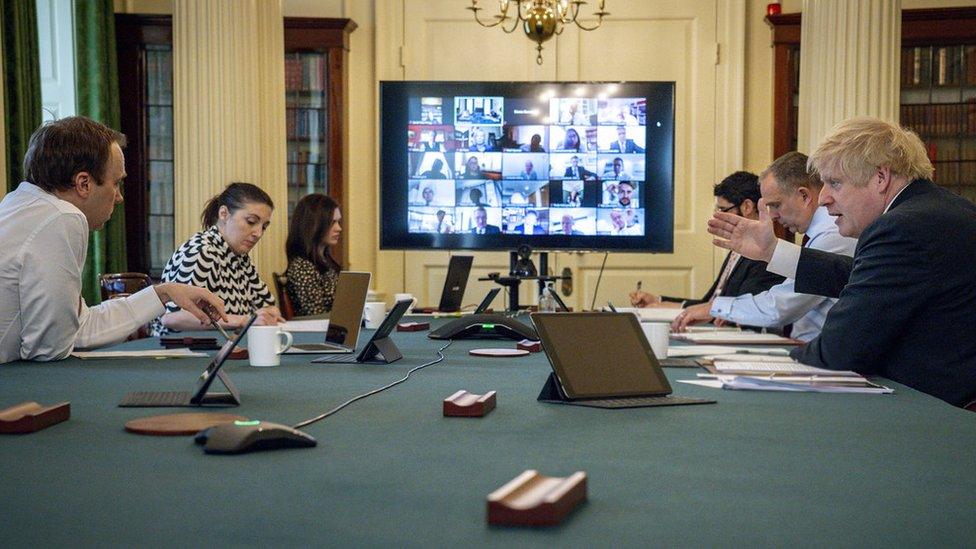
The prime minister held a digital cabinet meeting on Thursday
Meanwhile, Downing Street has said social distancing measures will not be relaxed if this would allow the virus to spread "in an exponential way".
"We are not going to gamble those sacrifices away by taking steps that will lead to an exponential growth in the disease again," the prime minister's official spokesman said.
It comes as the Scientific Advisory Group for Emergencies (Sage), which is working on a range of options for easing lockdown restrictions, prepares to meet later. The lockdown is due to be reviewed on 7 May.
Justice Secretary Robert Buckland said Sage would be reporting to the prime minister and to cabinet, with decisions about any easing of the lockdown being made on the basis of the evidence they provided.
However, he added: "Being absolutely frank, I don't think you're going to hear specific detail - I think that would be premature."
Asked about reports the lockdown may be extended until June, the prime minister's official spokesman said: "What you've obviously heard from [the UK's chief medical adviser] Chris Whitty is that this is a disease that is going to be around for a significant amount of time - he's said we have to be realistic, we're going to have to do a lot of things for a long period of time."
"Let's not pre-empt the review but, as the PM himself has said, the worst thing we could do is relax the social distancing measures too soon and throw away all of the progress which has been made thanks to the hard work and sacrifice of the British public," the spokesman added.
Scotland's First Minister Nicola Sturgeon has said next week may be "too early" to lift the lockdown restrictions "in any meaningful way".


What's next? The prime minister will not give chapter and verse later today on exactly how and when the country's doors will re-open.
But after meeting his cabinet virtually, Boris Johnson will seek to explain to the public how and why, if not exactly when, they will make the decisions that are vital, not just to our health, but the country's suffering economy too.
He'll restate the hurdles that must be passed before any restrictions are lifted, including making sure the NHS can cope, with tests, and equipment, and a consistent fall in the death rate.
Crucially he will emphasise the importance of the so-called "R" rate of infection - in other words, the extent to which people with the virus are passing it on.
That rate has come down significantly since the lockdown was imposed, slowing the spread of the disease. But Mr Johnson will outline how the "R" rate will be a crucial yardstick of whether to lift, or even reinstate, restrictions as the weeks go on.
Read Laura's full blog here.

Meanwhile, more than 9,000 people across England and Wales have been fined for breaking lockdown rules, figures from the National Police Chiefs' Council show.
Almost 400 fines were issued to repeat offenders, including one person who was fined six times.
Martin Hewitt, chair of the National Police Chiefs' Council, said although most of the public were adhering to the restrictions it would get harder as the weeks went on.
Earlier this week, Mr Johnson said the lockdown would not be relaxed too soon and details on any changes would be set out over the "coming days".
At Wednesday's press conference, Foreign Secretary Dominic Raab said the UK was still "coming through the peak" of the virus and called for people to maintain social distancing measures "until we are out of the woods".
The total number of people who have died in the UK with coronavirus has now passed 26,000, as official figures include some deaths in the community, such as in care homes, for the first time.
A new method of counting includes retrospective deaths since the beginning of March.
On Thursday a further 391 deaths were announced in England, along with 60 more deaths in Scotland, 22 more deaths in Wales and nine more in Northern Ireland.
The latest UK-wide figures - which use a different timeframe to those of individual nations - will be published later.
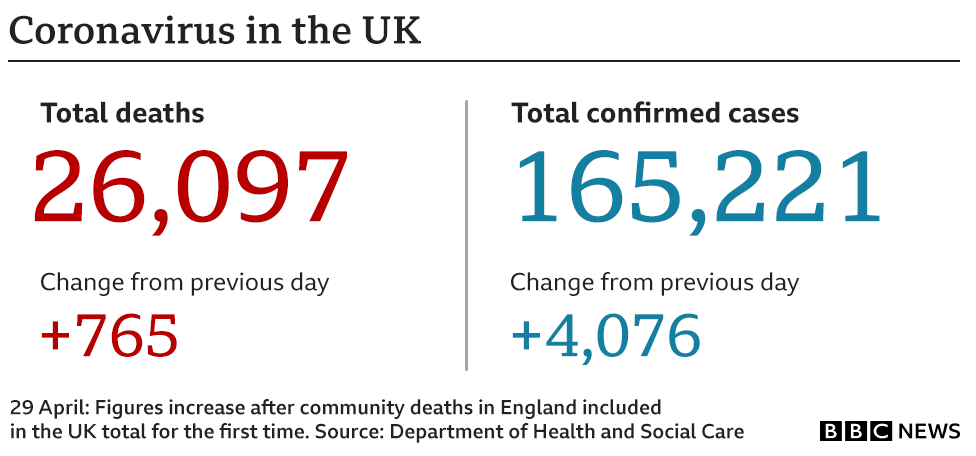

Testing target
Meanwhile, the government is facing questions over its target of 100,000 tests a day by the end of April.
A report by NHS Providers, which represents hospitals and NHS trusts in England, dismissed the target as a "red herring" and said it risked preventing the development of a "proper, next stage testing strategy".
Mr Buckland said even if the target wasn't met "we are well on our way to ramping this [testing] up" and "we are straining every sinew to get there".
"100,000 is an important milestone, but frankly we need more," the justice secretary told BBC Breakfast.
A spokesman for the Department of Health and Social Care said testing was "absolutely critical" and capacity at NHS and PHE laboratories had more than doubled within weeks.
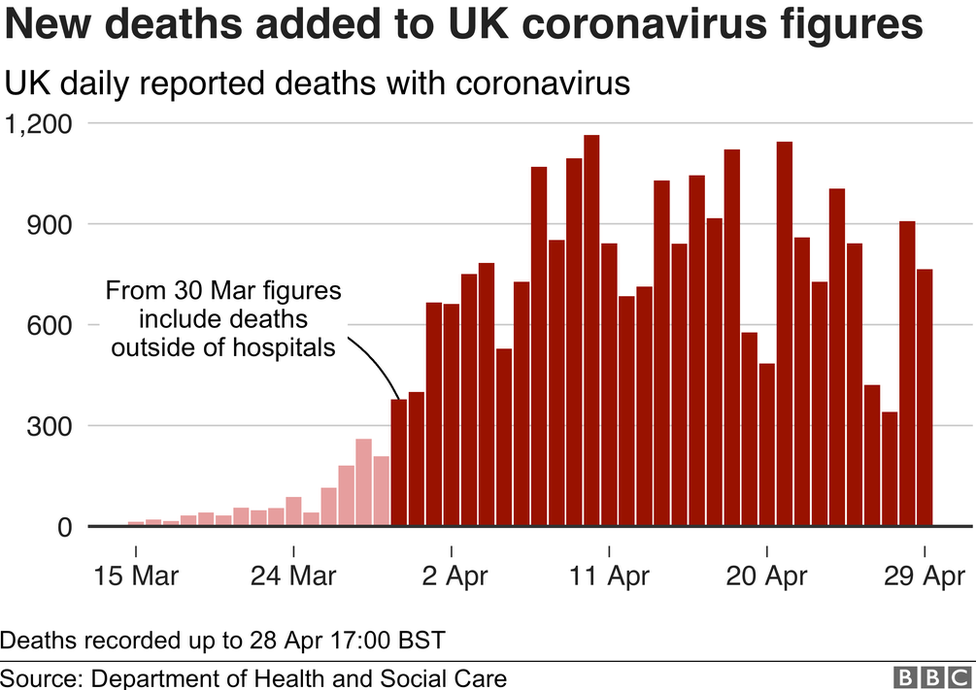

In other developments:
British Airways has told staff its Gatwick airport operation may not reopen after the pandemic passes
Captain Tom Moore, who raised more than £30m for the NHS by walking laps of his garden, has been made an honorary colonel on his 100th birthday
Pharmaceutical giant AstraZeneca has agreed to manufacture and distribute a coronavirus vaccine being developed by the University of Oxford if it proves effective
London's transport system may be unable to cope with a surge in demand when lockdown measures are lifted, a briefing to emergency planners says
Sainsbury's says customers are likely to see disruption to their shopping, including socially-distanced queues, until September
Firms that fail to refund people for holiday and weddings cancelled because of the pandemic could face legal action by the consumer watchdog
- Published17 June 2020
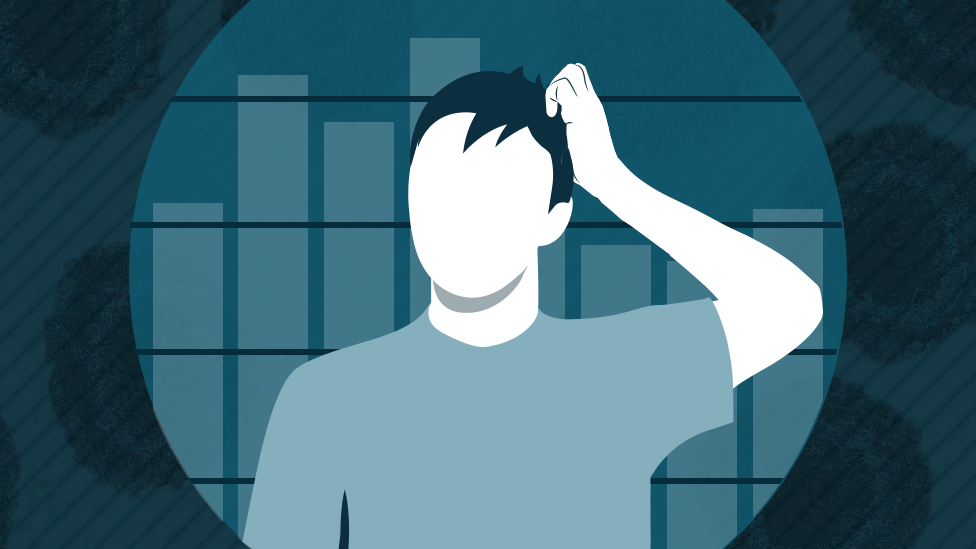
- Published29 April 2020
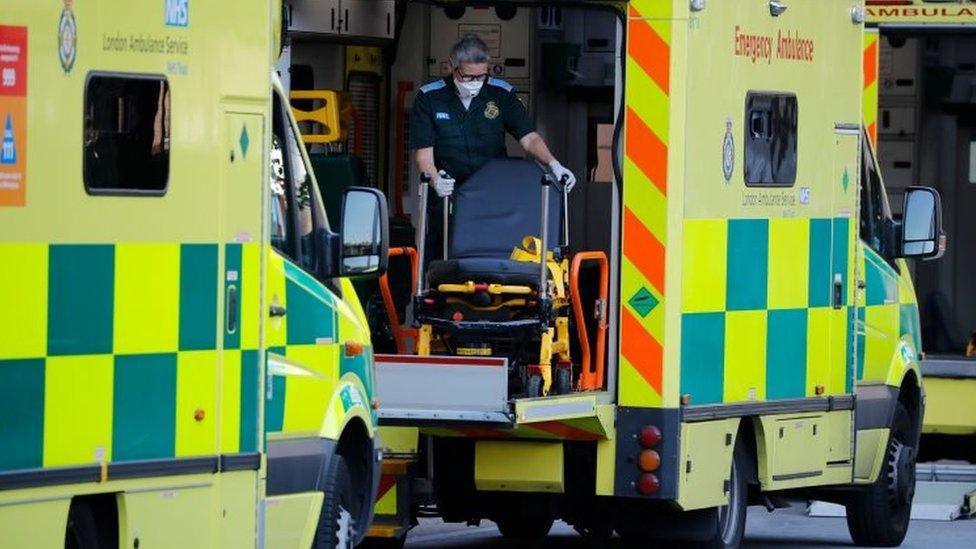
- Published29 April 2020
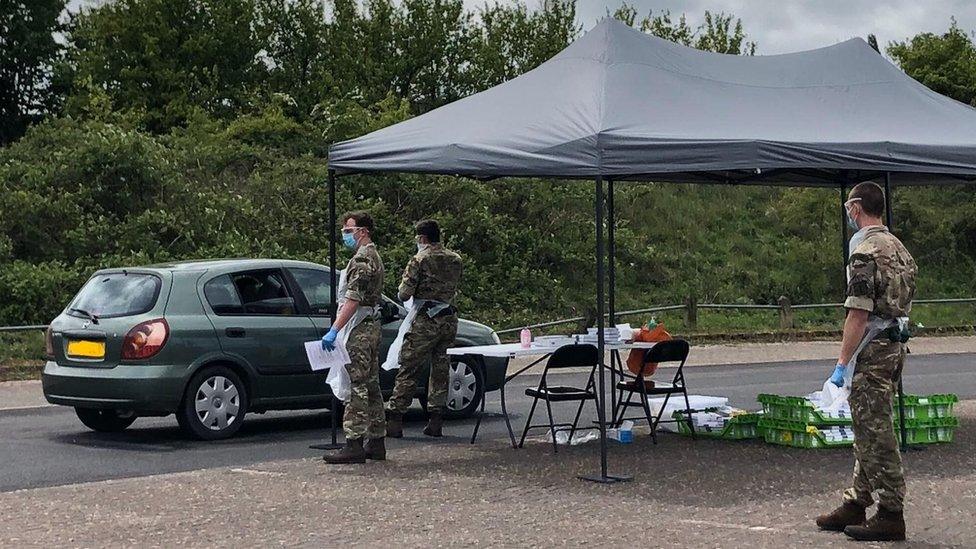
- Published29 April 2020
- Published29 April 2020
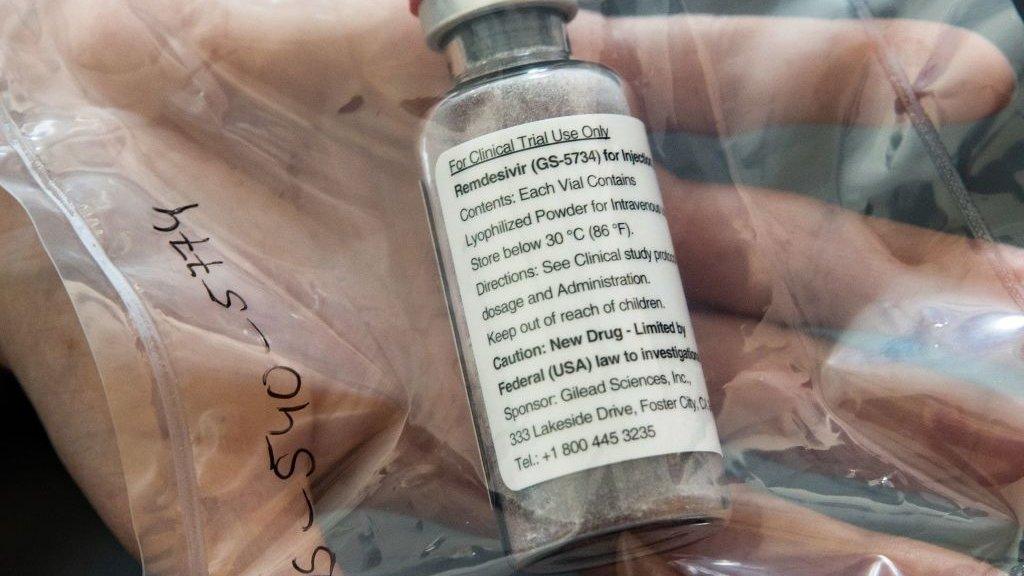
- Published29 April 2020
